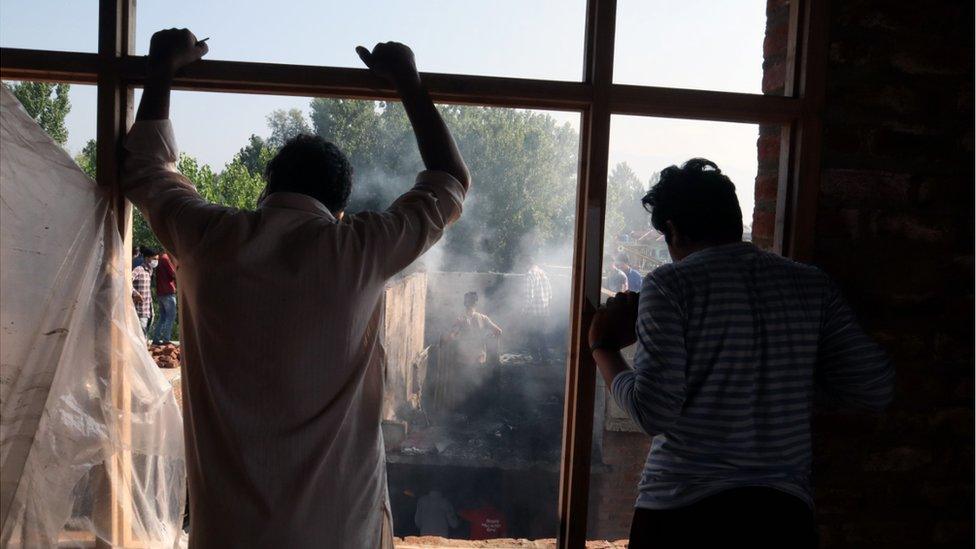Kashmir killings: The families still waiting for bodies of loved ones
- Published
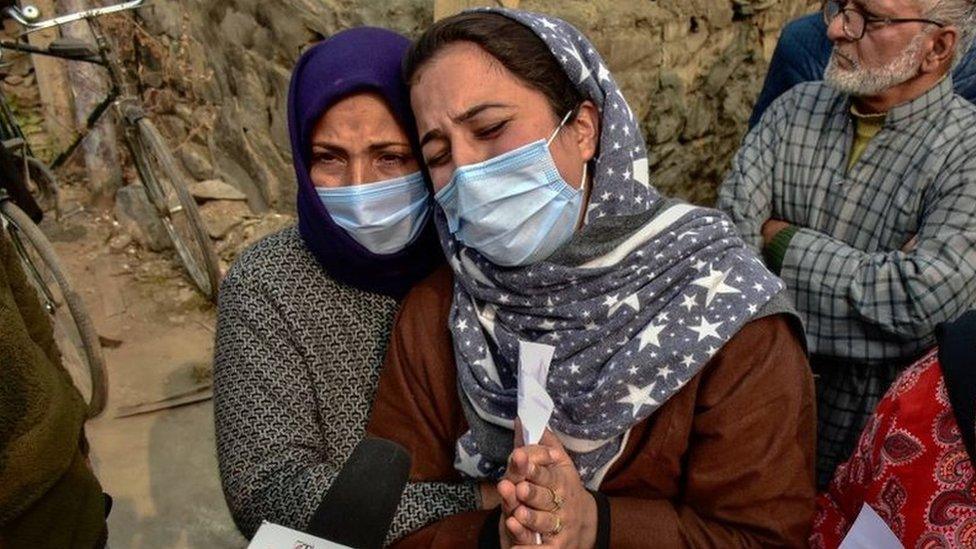
The family of one victim, Mudasir Gul, are challenging official accounts that he was caught in crossfire
On a cold November evening, the families of two men in Indian-administered Kashmir waited for their corpses to arrive - so they could bury them for the second time.
Altaf Bhat and Mudasir Gul had been buried once by security forces, who said the men were killed during a shootout with militants in Srinagar city.
Gul, they said, was associated with militants, while Bhat was caught in the crossfire.
But their families alleged they were used as "human shields".
After protests, authorities agreed to exhume their bodies and return them to the families - a rare move in the restive region.
They also said they would investigate the allegations, but this brought little comfort to the relatives.
"Nobody has got justice in the last 30 years. How can we expect it?" asked Abdul Majeed Bhat, Bhat's elder brother.
Security forces have long been accused of excesses towards locals in Kashmir, one of the world's most militarised zones.
India and Pakistan both claim Kashmir in full, but control only parts of it. An armed revolt has been waged in the India-administered region for over three decades, claiming thousands of lives.
In this period, hundreds of families have accused Indian security forces of branding civilians as militants and staging extrajudicial killings, sometimes for promotions.
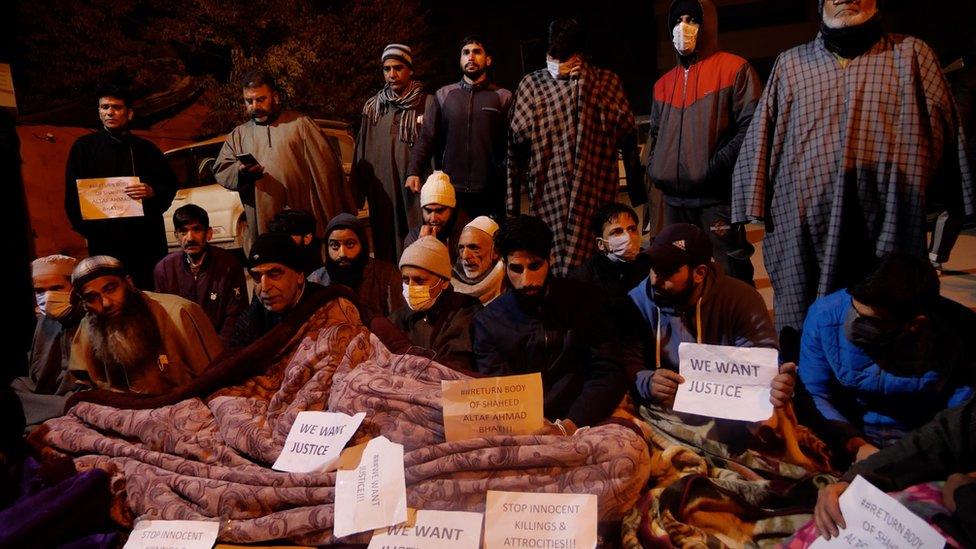
Relatives of Altaf Bhat and Mudasir Gul protested to get their bodies back
Activists say the situation has become worse since August 2019, when Jammu and Kashmir state was divided into two federally administered territories.
"Since 2019, the security forces have been implicated in numerous abuses while enforcing restrictions on movement including routine harassment and ill-treatment at checkpoints, arbitrary detention, torture, and extrajudicial killings," Human Rights Watch said in a recent statement.
Security forces have almost always denied these allegations.
Kuldeep Khoda, a former director general of Jammu and Kashmir Police, told the BBC that families often claim encounter killings are fake with little evidence. This, he said, delegitimises the forces' work.
But campaigners say families struggle even for basic information.
In 2017, activist Muhammad Ahsan Untoo filed a petition with Kashmir's Human Rights Commission, asking for details of all probes launched into extrajudicial killings since 1989 - around the time violent insurgency began against Indian rule.
He got his answer a year later: of the 506 inquiries ordered between 1989 and 2018, only one was completed.
Many cases, no answers
In July 2020, the Indian army announced it had killed three "hardcore terrorists" in a gunfight in south Kashmir's Shopian district.
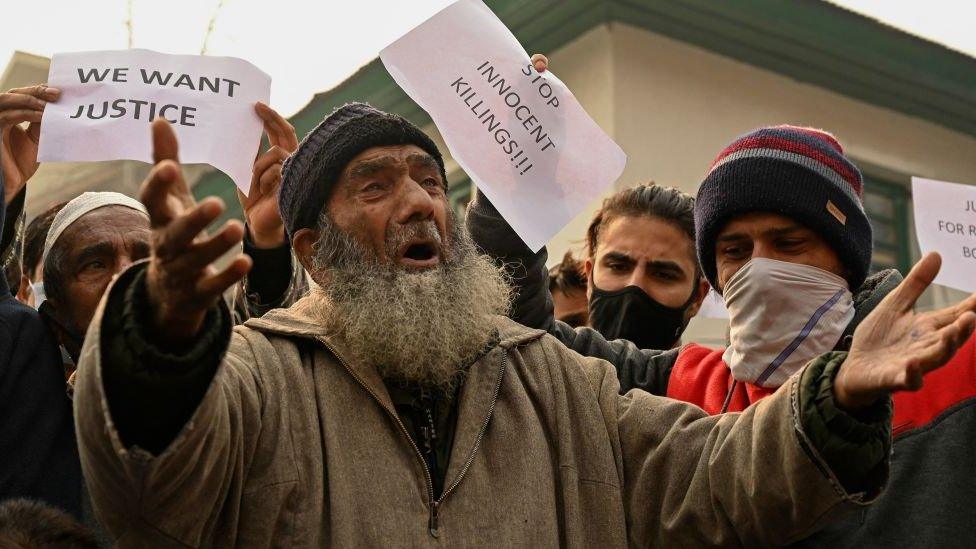
Hundreds of families have accused security forces of branding civilians as militants
They were buried secretly in far-off locations - in 2020, security forces stopped returning bodies of alleged militants to their families, citing coronavirus restrictions, but experts say this is to avoid large funerals which can worsen tensions.
In this case, photos of the three men surfaced on social media and reached their families, who said they were labourers who had gone missing.
A preliminary army inquiry - initiated after public outrage - found that the personnel involved had exceeded their ambit under the Armed Forces Special Powers Act, a controversial law that gives soldiers sweeping powers to arrest people without warrants and even shoot to kill sometimes.
A police complaint filed in December 2020 charged one army officer and two civilians with abduction and murder.
The case against the civilians is proceeding in a local court, but the status of the officer - the main accused - is unclear. He is being prosecuted in an army court, beyond civilian and media access.
The army's public relations officer didn't respond to the BBC's questions about the case's status.
Lack of information is not the only challenge.
Protesting relatives of a teenager who was killed by security forces in December 2020 were booked under the Unlawful Activities Prevention Act, an anti-terrorism law which makes it nearly impossible to get bail.
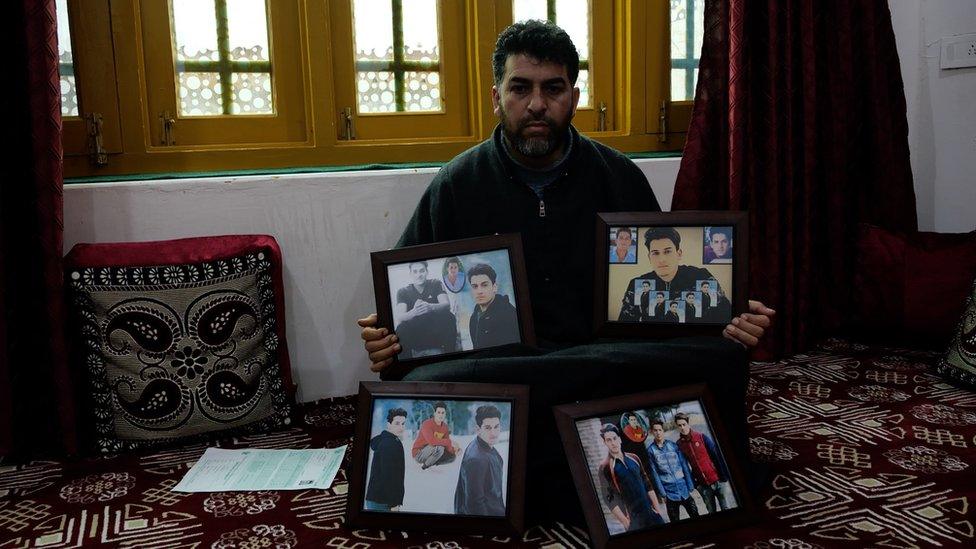
Mushtaq Ahmad Wani's son was killed in December 2020
Mushtaq Ahmad Wani, 42, told the BBC that his son, a school student, had no connection with militants.
Mr Wani has dug a grave near his house, and is still demanding that his son's body - buried far away - be returned to him.
Srinagar shootout
In the recent Srinagar case, police say they got information about a militant in a building.
Bhat owned the building and Gul ran a real estate firm from it.
"The premises were checked but no militant was found," said a top Jammu and Kashmir police officer, who didn't want to be identified as he is not authorised to speak about the incident.
He said that Bhat, Gul and Amir Magrey - who did odd jobs for Gul - were sent up to unlock the locked rooms on the top floor where they suspected the militant was hiding. The three men were followed by armed policemen.
"Within 15 minutes, we heard two gunshots, and our men retaliated," the police officer said. "Then someone ran out of the building holding a revolver, we fired at him."
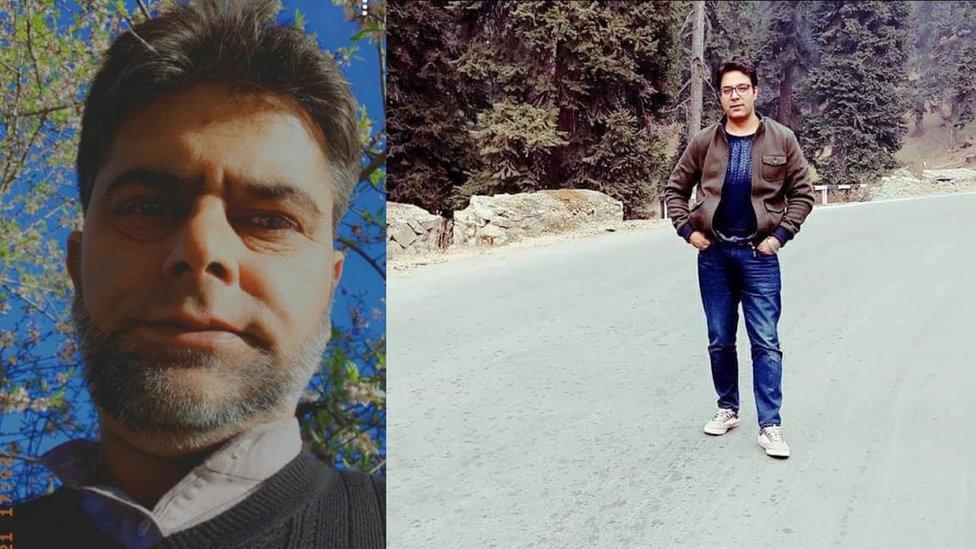
Altaf Bhat, left, and Mudasir Gul
Police later identified this man as Bilal Bhai, a "foreign militant".
The officer said they found the bodies of Magrey and Bhat at the bottom of the stairs, with a revolver in Magrey's hand.
Magrey's family has also said he is innocent and asked for his body to be returned to them. Gul's body was found on the top floor, the officer said.
But an eyewitness, who didn't want to be identified, questioned this version.
Just before the shootout, he told the BBC, plain-clothed men cordoned off the place.
They frisked civilians in the area, took their mobile phones and asked them to stay in a nearby shop.
Bhat, who owned the building, was called out of the room thrice, said this person. The third time, Bhat asked Gul to accompany him upstairs, he said.
"Then we heard gunshots."
He asked why civilians were sent into the building without protective gear.
Mr Bhat said his brother's youngest child, 3, had just one question.
"He keeps asking me, please get my father. But where will I bring him from?"
Additional reporting by Auqib Javeed, a Srinagar-based freelance journalist.
- Published29 May 2021
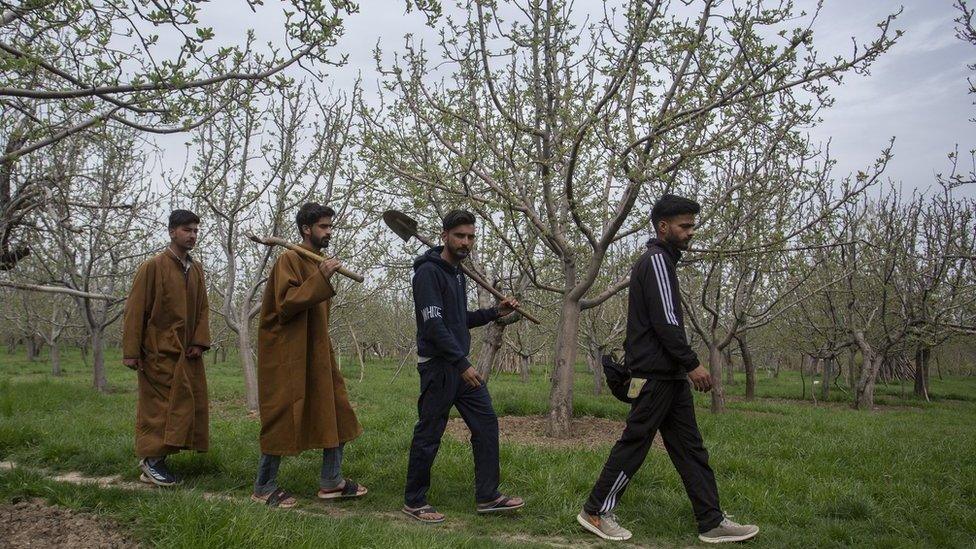
- Published5 August 2021
